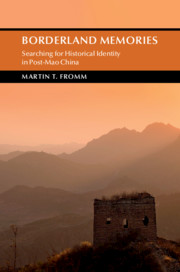Book contents
- Borderland Memories
- Cambridge Studies in the History of the People’s Republic of China
- Studies of the Weatherhead East Asian Institute, Columbia University
- Borderland Memories
- Copyright page
- Dedication
- Contents
- Acknowledgments
- Introduction
- 1 Reconfiguring Cultural Production in the Post-Mao Transition
- 2 Borderland Ambiguities in Narratives of Modernization and Liberation
- 3 Relocating the Nation outside the Nation
- 4 The “Historical Science” of Wenshi Ziliao
- 5 Affective Community and Historical Rehabilitation
- 6 Mobilizing a “Patriotic United Front”
- 7 Local, Regional, and National Dynamics of Wenshi Ziliao Production
- Conclusion
- References
- Index
- Studies of the Weatherhead East Asian Institute, Columbia University
1 - Reconfiguring Cultural Production in the Post-Mao Transition
Published online by Cambridge University Press: 18 February 2019
- Borderland Memories
- Cambridge Studies in the History of the People’s Republic of China
- Studies of the Weatherhead East Asian Institute, Columbia University
- Borderland Memories
- Copyright page
- Dedication
- Contents
- Acknowledgments
- Introduction
- 1 Reconfiguring Cultural Production in the Post-Mao Transition
- 2 Borderland Ambiguities in Narratives of Modernization and Liberation
- 3 Relocating the Nation outside the Nation
- 4 The “Historical Science” of Wenshi Ziliao
- 5 Affective Community and Historical Rehabilitation
- 6 Mobilizing a “Patriotic United Front”
- 7 Local, Regional, and National Dynamics of Wenshi Ziliao Production
- Conclusion
- References
- Index
- Studies of the Weatherhead East Asian Institute, Columbia University
Summary
Chapter 1 situates the wenshi ziliao within the context of post-Mao cultural production and ideology in the 1980s. The party-state integrated professionalization and expertise-based specialization with political mobilization, and adopted a flexible experimental approach to reform in the economic and cultural arenas. Whether in the form of special economic zones, news and entertainment media structures, sites of official commemoration, or oral history projects, local elites and officials were given officially sanctioned space to undertake economic and cultural initiatives. This moment of innovation and experimentation involved the historical rehabilitation of entrepreneurs, intellectuals, Guomindang (GMD) affiliates, and other former “counterrevolutionaries.” Historical production by the People’s Political Consultative Conference and wenshi ziliao committees adhered to central guidance and local initiative. Through the PPCC’s mandate of “inspect, consult, and reeducate,” the state applied to the realm of historical investigation a combination of strategies for gauging local conditions, seeking popular legitimacy, and asserting political control. Wenshi ziliao organizers called for “united front” materials and interwove the stories of a wide spectrum of historical actors ranging from Party revolutionaries to former shop owners, gold miners, bandits, and GMD officials.
Keywords
- Type
- Chapter
- Information
- Borderland MemoriesSearching for Historical Identity in Post-Mao China, pp. 20 - 44Publisher: Cambridge University PressPrint publication year: 2019

